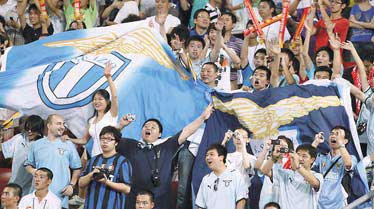Society
Chinese fans still get their kicks out of Italian teams
(China Daily)
Updated: 2010-10-08 07:23
 |
Large Medium Small |
BEIJING - Chinese fans remain enthusiastic toward Italian soccer, even though Serie A has been somewhat overshadowed by the Spanish league in recent years.
 Fans of Italian soccer team Lazio applaud the team, when it competed for the Italian Super Cup with FC Inter Milan, at the Bird’s Nest on Aug 8, 2009. [Photo/China Daily] |
"The Italian league still has a considerable local fan base thanks to its 20-year exposure in China," said Wang Wen, president of the Beijing Fans Club.
"Last year's Super Cup clash between Inter Milan and Lazio in Beijing re-ignited fans' memories and I believe any presence by teams like AC Milan, Inter Milan, Roma and Juventus will be warmly welcomed."
|
Related readings: |
However, compared with the quick progress of other European leagues, Serie A is giving way to its counterparts.
"The fan base of Serie A is gradually decreasing, while the Spanish league is becoming more popular," Wang said.
He said the loss of stars is the most crucial reason for the dwindling influence of Serie A in China.
The league's comparatively ordinary performance, Italy's soccer scandal in 2006, and the Chinese national TV station's failure to offer the best broadcasting package which included matches among AC Milan, Inter, Roma and Juventus in the past several years also contributed to the league's loss of fans in China, Wang added.
To some extent, the past four years was a golden period for Italian soccer. Its national team won the World Cup in 2006, and Italian giant Inter Milan sealed a treble last season by topping the Italian league, European Football Championship and Italy Cup.
But according to Wang, the national team's glory and the club's success didn't gain more attention for Serie A.
Since Real Madrid's first visit to China in 2003, the club, together with another Spanish powerhouse, Barcelona, has listed China as one of the most important places to expand its influence and profitability.
The Spanish league also moved the starts of some matches earlier to suit an Asian audience, while the Italian side spent less energy in developing the Chinese market.
Early this year, rumors persisted that AC Milan and Roma were going to play in the Bird's Nest in Beijing this August - which created a large buzz among Chinese fans - but it turned out to be rumor.
It was also said that China Central Television might stop broadcasting Serie A due to rising rights fees and schedule conflicts with the Spanish league from this season, but luckily the CCTV sports channel finally reached an agreement with the Italian side.



